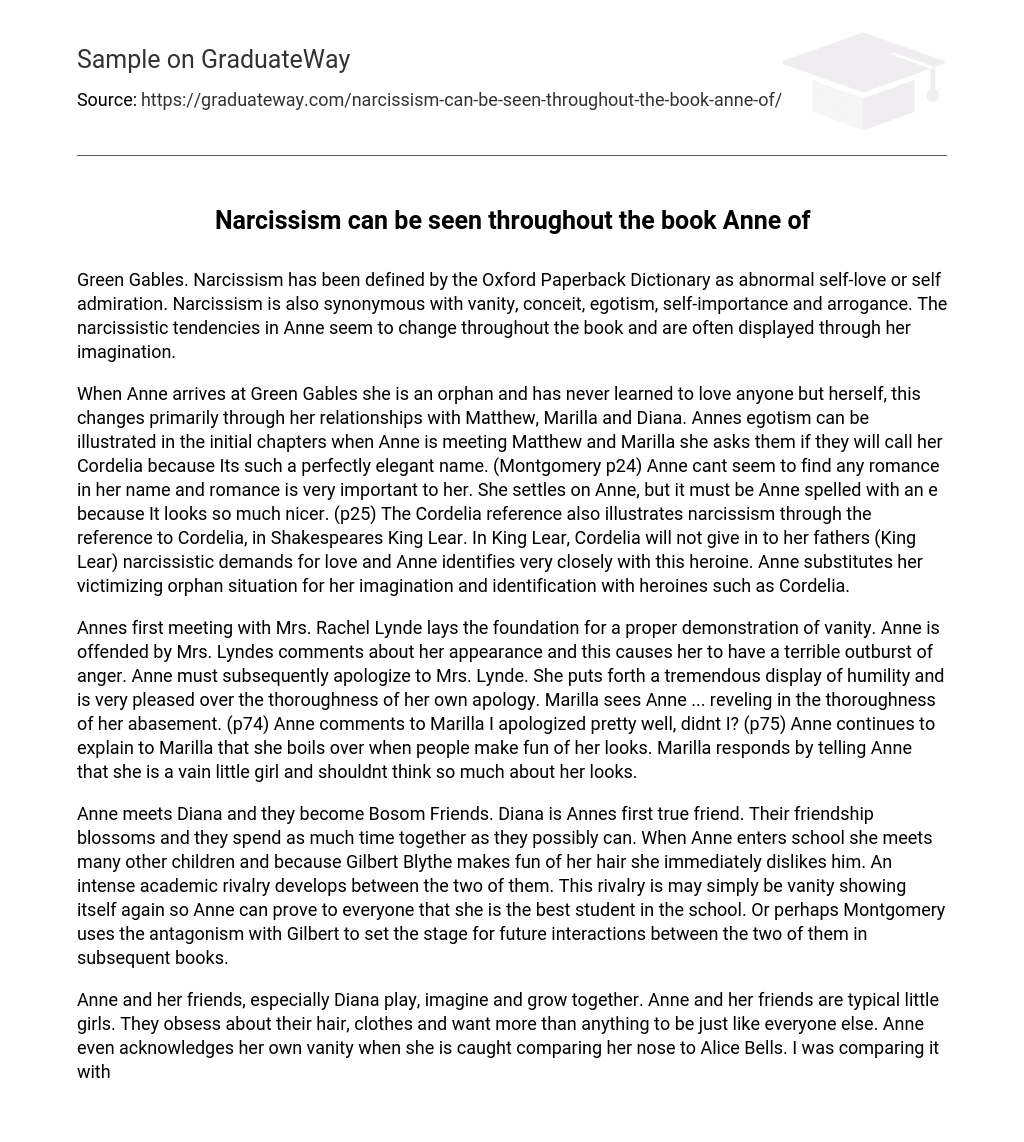The Oxford Paperback Dictionary provides a definition of narcissism as an unusual fondness for oneself or self-admiration, which is also associated with vanity, conceit, egotism, self-importance, and arrogance. Throughout the book, Anne demonstrates varying narcissistic behaviors that are frequently expressed through her imagination.
Upon her arrival at Green Gables, Anne is initially depicted as an orphan who has solely cherished herself. Nonetheless, her interactions with Matthew, Marilla, and Diana prompt a transformation in her character. At first, Anne’s self-centeredness becomes evident when she demands that Matthew and Marilla refer to her as Cordelia because she perceives it as a sophisticated name (Montgomery p24). She fails to see any appeal in her own given name, which holds significant meaning for her. Gradually, she compromises by selecting the name Anne but appends an “e” for visual purposes (p25). The mention of Cordelia from Shakespeare’s King Lear further emphasizes Anne’s narcissism. In the play, Cordelia rebels against her father’s narcissistic craving for love—a characteristic that strongly resonates with Anne. As an orphan, Anne escapes from her challenging circumstances through imagination and identification with powerful female characters like Cordelia.
Anne’s initial encounter with Mrs. Rachel Lynde sets the stage for a clear demonstration of arrogance. Mrs. Lynde’s remarks about Anne’s appearance offend her and result in a severe explosion of anger. Anne is subsequently compelled to apologize to Mrs. Lynde. She offers a remarkable display of humility and takes great satisfaction in the thoroughness of her apology. Marilla notices Anne … delighting in the completeness of her self-abasement (p74). Anne remarks to Marilla, “I did a pretty good job of apologizing, didn’t I?” (p75). Anne goes on to explain to Marilla that she becomes enraged when people mock her appearance. In response, Marilla tells Anne that she is a conceited young girl and shouldn’t excessively concern herself with her looks.
Anne and Diana meet and quickly become close friends. Diana is Anne’s first genuine companion, and they spend a significant amount of time together. However, things change when Anne starts attending school and encounters Gilbert Blythe, who mocks her hair, causing an instant dislike towards him. This incident sparks a fierce academic competition between the two. The rivalry could possibly arise from Anne’s vanity and her aspiration to establish herself as the top student in the school. On another note, Montgomery may utilize the animosity between Anne and Gilbert to set the groundwork for their future interactions in subsequent books.
Anne and her friends, particularly Diana, imagine and grow together. They are typical little girls who obsess over their hair and clothes and desire to be like everyone else. Anne even admits to her own vanity when she compares her nose to Alice Bells. She is aware that thinking too much about her nose is vanity, influenced by a compliment she received long ago (p207). Her narcissism leads her to dye her hair green in an unsuccessful attempt to turn it black, resulting in trouble. However, this incident helps Anne overcome her vanity, as she later states that it cured her (p227). Through her growth, Anne becomes less self-absorbed and shifts her focus towards academics. Marilla plays a crucial role in preventing Anne from indulging in vanity. When Anne achieves the top ranking in the Island on the Queens admission exams, she consciously resists the temptation of indulging in vanity. Therefore, Annes transformation from an overtly narcissistic child to a conscious young adult is one of the main themes of this remarkable book.
Works Cited: Montgomery, L.M. Anne of Green Gables. Toronto: Seal Books, 1908.
The Oxford Paperback Dictionary in its 4th edition was published by Oxford University Press in 1994.
—–





